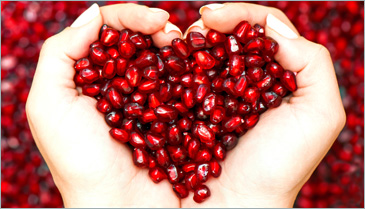 Holistic heart doctor, and Daniel Plan Wellness Contributor, Joel K. Kahn, MD, teaches us the biblical history of pomegranates and how they can improve your health.
Holistic heart doctor, and Daniel Plan Wellness Contributor, Joel K. Kahn, MD, teaches us the biblical history of pomegranates and how they can improve your health.
I am constantly amazed at the power of the human body to heal itself by removing harmful habits (e.g. smoking, high fat and processed foods, excess sugar) and replacing them with healthy choices. Introducing brightly colored plant based foods often accelerates healing. Recent science has shown that pomegranates (Latin for seeded apple) have powerful abilities to promote heart and artery health. What is even more intriguing is that pomegranates have roots mentioned in the Bible and serve both a spiritual and physical role.
While some authorities speculate that the forbidden fruit picked by Eve in the Garden of Eden was a pomegranate, there is a clear order from God to Moses in Exodus 28:33-34 to embellish the robe of the high priest in the Temple with pomegranates of blue, purple and scarlet. Aaron was protected when entering the Holy of Holies by wearing this robe, beginning the symbolism of pomegranates and vitality. Pomegranates are listed as one of the Seven Species special to the Holy Land of Israel (along with wheat, barley, grapes, figs, dates, and olives) in Deuteronomy 8:8. In 1 Kings 7:13-22, pomegranates adorn the capitals of two pillars, and in Song of Solomon 4:3 pomegranates are used as analogy for beauty. In Christian liturgy the pomegranate is a symbol of the resurrection and the hope of eternal life. The abundance of seeds has been used to represent the many believers who make up the church. In Christian art the pomegranate is often held in depictions of the Madonna and Child, such as the famous example by Botticelli.
Turning to medical research on pomegranates, it is known that they are rich in antioxidants. They also may aid in HDL cholesterol working more effectively to remove plaque from arteries (reverse cholesterol transport, a miracle of sorts). For these reasons, a number of studies have been done on the effects of this unusual fruit and the results are startling.
- Dr. Dean Ornish and colleagues studied the effects of drinking 8 oz. daily of pomegranate juice (PJ) in patient with heart disease and abnormal stress tests (http://www.ncbi.nlm.nih.gov/pubmed/16169367). After 3 months, blood flow improved in those drinking PJ and worsened in a control group.
- Scientists measured the amount of plaque in the carotid arteries of 10 patients for 1-3 years who were asked to drink 8 oz. daily of PJ. (http://www.ncbi.nlm.nih.gov/pubmed/15158307) . The amount of plaque decreased even after one year and blood pressure fell. Markers of inflammation and oxidation fell too. A larger study of 146 patients demonstrated the same findings limited to patients with the most oxidative stress.
- Thirteen patients with high blood pressure were given 5 oz. of PJ and blood pressure was reduced 7% (http://www.ncbi.nlm.nih.gov/pubmed/24575134). There was a trend to better artery function and less oxidation. A subsequent experiment over 2 weeks showed that blood pressure remained lower with daily PJ consumption.
- Cholesterol was measured in 22 patients with diabetes given a concentrated PJ for 8 weeks (http://www.ncbi.nlm.nih.gov/pubmed/17048194). Total and LDL cholesterol fell and was not explained by any other changes in diet.
I recommend eating pomegranates to my patients and I prefer that they get the whole fruit including all the fiber. If they prefer, PJ may be second best. There are many pomegranate tablets and capsules commercially available but at least one study raised concerns over whether these have the active chemicals found in the whole fruit (http://www.ncbi.nlm.nih.gov/pubmed/20349921). Of 27 samples tested, only 5 had the profile of the whole pomegranate and 5 had none at all! So never take pomegranates for granted and enjoy their spiritual and healing powers regularly.
By: Joel K. Kahn, M.D.
The Holistic Heart Book




